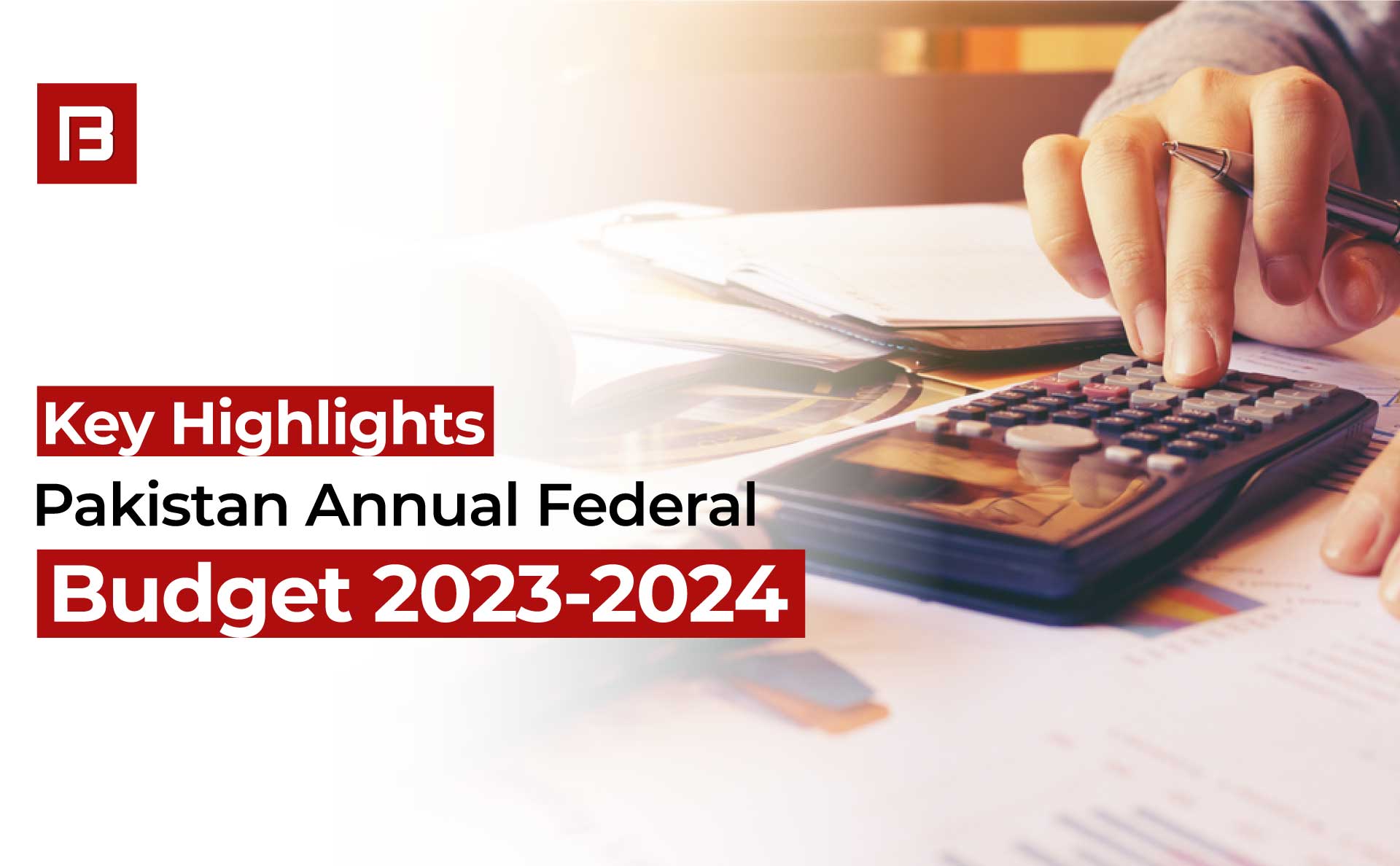Key Highlights From Pakistan’s Annual Federal Budget 2023-2024

The much-anticipated annual federal budget for Pakistan’s fiscal year 2023-2024 was announced on June 9, 2023. This budget holds significant importance for individuals, businesses, and the overall economy of the country.
In this article, we will dig into the notable highlights of the budget, particularly focusing on the income tax and sales tax changes, which play a vital role in shaping the financial landscape.
Income Tax Reforms:
- Higher Tax Slabs for High-Income Earners: The budget introduces new tax slabs for individuals earning above Rs. 300 million, Rs. 400 million, Rs. 500 million, and exceeding Rs. 500 million. The corresponding tax rates for these slabs are 4%, 6%, 8%, and 10% respectively. This change aims to enhance the progressive nature of the tax system.
- Cash Withdrawal Tax: Non-filers are subject to a 0.6% tax on cash withdrawals exceeding Rs. 50,000 per day. This measure encourages individuals to become tax filers and contribute to the formal economy.
- Tax on Bonus Shares: The budget proposes a 10% tax on bonus shares for filers and a higher rate of 20% for non-filers. This move aims to generate additional revenue from capital gains arising from bonus share issuances.
- Withholding Tax on International Transactions: The withholding tax on international transactions made through debit/credit cards has been increased. For filers, the rate rises from 1% to 5%, and for non-filers, it jumps from 2% to 10%. This measure intends to boost revenue collection from cross-border transactions.
- SME Expansion: The turnover limit for Small and Medium Enterprises (SMEs) has been raised significantly for manufacturers, from Rs. 250 million to Rs. 800 million. Additionally, the budget includes the IT and IT-enabled services sector within the SME category, promoting growth and innovation.
- Tax Credits for Property Construction: Individuals and builders undertaking property construction during the tax years 2024-2026 will benefit from tax credits. For individuals constructing their own house, the credit is capped at the lower of 10% of tax liability or Rs. 1 million. Builders can avail a credit of 10% of tax liability or up to Rs. 5 million for new construction projects.
- Exemption for Non-Resident Pakistanis: Non-resident Pakistanis purchasing immovable properties through Foreign Currency Value Accounts (FCVA) or NRP Rupee Value Accounts (NRVA) will be exempt from advance tax. This measure aims to encourage investment from overseas Pakistanis.
- Increased Limit for Foreign Remittances: The budget raises the limit for foreign remittances from Rs. 5 million to USD 100,000 per year. Remittances within this limit will not be subject to inquiries regarding their nature and source, streamlining the process for overseas Pakistanis.
- Tax Relief for IT Exporters: Exporters of IT and IT-enabled services are no longer required to file sales tax returns to avail the reduced tax rate under the final tax regime. This change simplifies the tax compliance process for IT exporters, fostering growth in the sector.

Sales Tax Adjustments:
- Electricity Excluded from Federal Tax Regime: The production, transmission, and distribution of electricity are no longer considered “Goods” or “Supply” for federal tax purposes. This change aims to streamline the taxation process for the energy sector.
- Abolishment of Criteria for Tier-1 Retailers: The budget removes the criteria determining the status of “Tier-1 Retailers” who were required to integrate their Point of Sale systems with the Federal Board of Revenue (FBR). This change benefits retailers with shop areas of 1000 sq. feet or 200 sq. feet (for furniture shops) and those engaged in jewelry trade.
- Increased Sales Tax Rate for Textile and Leather: Tier-1 Retailers dealing in leather and textile products will now face an increased sales tax rate of 15% instead of the previous 12%. This measure aims to enhance revenue collection from these sectors.
- Tax Waiver for IT-related Imports: Software exporters registered with the Pakistan Software Export Board can now import IT-related products without paying sales tax. This incentive supports the growth of the IT sector and encourages software exports.
- Lower Sales Tax Rate for Medicine: The sales tax rate on substances registered as drugs and medicine has been reduced significantly from 18% to 1%. This change aims to make healthcare more affordable and accessible to the public.
- Withdrawal of Sales Tax Exemption for Bulk Edible Product Sales: The exemption of sales tax on the bulk sale of branded edible products, including milk, yogurt, and red chilies, is proposed to be withdrawn. This measure aims to generate additional revenue from the sale of these products.
This new budget has also highlighted the importance of tax filing for individuals, as it introduces evident advantages for taxpayers who proactively fulfill their tax obligations. In order to facilitate this process, Befiler has developed an innovative online platform, The Befiler App and web, that empowers individuals to effortlessly become filers and effectively file their taxes with utmost convenience.
Through our user-friendly interface and streamlined procedures, we strive to simplify the tax filing experience, ensuring that individuals can easily navigate through the complexities of the system and promptly fulfill their obligations while capitalizing on the benefits proposed by the budget 2023.

